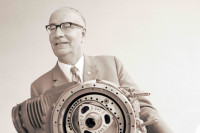In the late 1960s, the Wankel engine was seen as the engine of the future, but that was short-lived. Only Mazda kept believing … until 2012, when the RX-8 disappeared. But the Mazda MX-30 R-EV shows that the Japanese haven’t lost their faith after all. Every reason to take some fragile truth.
1. ‘Ottomotor is very disturbing’
Felix Wankel (1902-1988) was only 17 years old when he realized that the up-and-down movement of the pistons and connecting rods in a traditional four-stroke engine – also called the Otto engine – was unnecessarily complicated. Mainly because the crankshaft must be turned back into a rotating movement.
2. Just turn around
An engine that would go through its four phases of operation while running seemed ideal for Wankel. In addition, such an engine may be more complex and have fewer parts. Wankel went to work…

A hint
Well insured on the road
Choose the service that matches your (electric) car with Interpolis Car Insurance. Average cost of €0 and free repair option.
3. Collaboration Felix Wankel and NSU
The first Wankel single-disc engine began to work in the 1950s. Thanks to Wankel’s contact with the head of engine development and car manufacturer NSU, the engine could be tested in NSU racing engines.
4. The first car with a Wankel engine
After a phase of endurance testing in the modified NSU Prinz, Wankel and NSU got the engine ready for its first market in the car in 1957. NSU installed the Wankel single disc engine in the fastest version of the Prinz Spider.


5. Automakers on the ‘engine of the future’ line
NSU and Felix Wankel entered into an agreement, which meant that Wankel would receive 40 percent of all license agreements. That didn’t hurt him, because carmakers were queuing up for his invention – the ‘engine of the future’. Not only Mazda, but also MercedesGeneral Motors in Citroën.
6. NSU Ro 80 en Mazda Cosmo
The most famous car with a Wankel engine is of course the NSU Ro 80, which won Car of the Year in 1967. It had a Wankel twin-disc engine, as did the Mazda Cosmo Sport of the same year.


7. 30,000 km warranty
NSU offered a 30,000 km warranty on the Ro 80 engine, which was unique at the time. It ultimately cost the company its life, because NSU ended up paying for warranty costs due to faulty engine seals.
8. The Wankel engine was renamed the rotary engine
Partly because of the bad name the Ro80 gave the Wankel engine, Mazda renamed it the ‘rotary engine’.
9. Futuristic Mercedes with a Wankel engine
Mercedes put the Wankel engine in the research model C111 (1969). But early in 1971 the manufacturer pulled the plug on engine development; we couldn’t make it last more than 100,000 km.

10. Citroën is losing millions of dollars due to a faltering project
Citroen held onto hope longer than Mercedes. After an extensive testing phase with the M35 (an Ami 8 Coupé), it took the GS Birotor into production in 1973. Only 847 were sold. The failed project cost Citroen many millions.


11. Lada and rotary engines for police and KGB
Even Lada got involved in the Wankel craze and built classic-looking models with a twin-disc Wankel engine for the police and the KGB. The last Lada to rock was the Samara which reached a top speed of 190 km/h. In 2001, the Russians also had enough.
12. The rotary engine of two million Mazdas
Originally Mazda lasted until 2012, producing about two million cars with the Wankel…er…rotary engine. The last – until the introduction of the MX-30 R-EV in 2023 – was the RX-8. Like its modern successor, the four-door sports car had hatches at the back.


13. Successful RX-7
The most successful Rotary Mazda was the RX-7, of which three generations were produced. The latest version (with two turbos!) also had its share of successes on the circuit.
14. A Dutch motorcycle with a Wankel engine
Dutch motorcycle brand Van Veen introduced the OCR 1000 in 1977. The Wankel engine for the super expensive machine came from Comotor, a subsidiary of Audi-NSU and Citroën.


























